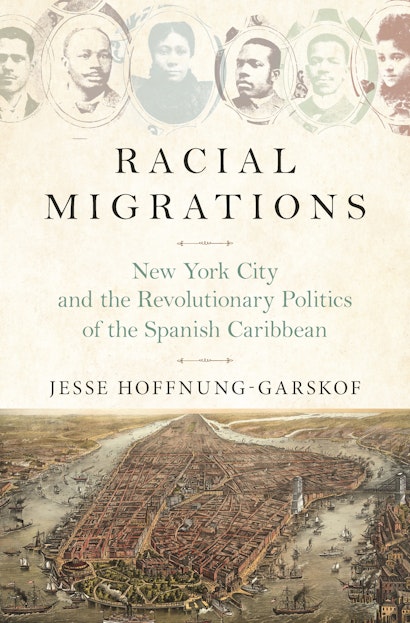In the late nineteenth century, a small group of Cubans and Puerto Ricans of African descent settled in the segregated tenements of New York City. At an immigrant educational society in Greenwich Village, these early Afro-Latino New Yorkers taught themselves to be poets, journalists, and revolutionaries. At the same time, these individuals—including Rafael Serra, a cigar maker, writer, and politician; Sotero Figueroa, a typesetter, editor, and publisher; and Gertrudis Heredia, one of the first women of African descent to study midwifery at the University of Havana—built a political network and articulated an ideal of revolutionary nationalism centered on the projects of racial and social justice. These efforts were critical to the poet and diplomat José Martí’s writings about race and his bid for leadership among Cuban exiles, and to the later struggle to create space for black political participation in the Cuban Republic.
In Racial Migrations, Jesse Hoffnung-Garskof presents a vivid portrait of these largely forgotten migrant revolutionaries, weaving together their experiences of migrating while black, their relationships with African American civil rights leaders, and their evolving participation in nationalist political movements. By placing Afro-Latino New Yorkers at the center of the story, Hoffnung-Garskof offers a new interpretation of the revolutionary politics of the Spanish Caribbean, including the idea that Cuba could become a nation without racial divisions.
A model of transnational and comparative research, Racial Migrations reveals the complexities of race-making within migrant communities and the power of small groups of immigrants to transform their home societies.
Awards and Recognition
- Winner of the Theodore Saloutos Book Award, Immigration and Ethnic History Society
- Co-Winner of the Kenneth Jackson Award for Best Book (North American), Urban History Association
- A Choice Outstanding Academic Title of the Year
"It is impossible to do justice to such well-researched, skilfully crafted, beautifully written, and thought-provoking book as Hoffnung-Garskof’s in a short review. . . . Racial Migrations [is] a model of research and writing, and a source for future research."—Antonio Hernández Matos, European Review of Latin American and Caribbean Studies
"Based on extensive and imaginative research, and written with a wonderful touch, the book offers, as one of its back-cover tributes puts it, a model for how to produce a transnational history of migration and race. . . . Hoffnung-Garskof offers a deep immersion in the world-view of these migrants."—Peter Hulme, New West Indian Guide
"A fantastic and important work."—Dalia Antonia Caraballo Muller, Estudios Interdisciplinarios de America Latina y el Caribe
"Racial Migrations is a timely exploration of the political subjectivities and organizing practices of Black and racially-mixed Cuban intellectuals, activists, and workers in their nineteenth-century struggles for freedom, democratic participation, and racial equality. . . . [An] enticing reading."—Ileana María Rodríguez-Silva, CENTRO Journal
"Jesse Hoffnung-Garskof’s Racial Migrations employs a microhistorical approach to depict how Cubans and Puerto Ricans of African descent negotiated with non-Black revolutionaries to secure their full rights as citizens. . . . Racial Migrations eloquently explores how people of African descent from different walks of life and nationalities united under cross-social and multiracial social clubs."—Andrea Carolina Morales Loucil, World History Connected
"Following carefully a 'printed trail of clues' produced by a remarkable group of radicals of African descent, from Cuba and Puerto Rico to the United States, Hoffnung-Garskof offers a rich reconstruction of a vibrant and little-known world of black activism and intellectual production. Giving readers access to important history through interconnected stories, Racial Migrations is beautifully written."—Alejandro de la Fuente, Harvard University
"Hoffnung-Garskof's study of black immigrants from the Spanish Caribbean in late nineteenth-century New York captures brilliantly the experience of 'migrating while black and Latino.' Superbly written, researched, and argued, this sophisticated and nuanced book will be immensely important, a model work of transnational history of migration and race."—Ada Ferrer, New York University
"In this beautifully written book, New York City assumes its rightful place as one of America's great crossroads. Hoffnung-Garskof brings to life a fascinating cast of characters and charts their remarkable voyages between exile and home; Cuba, Puerto Rico, and Manhattan; and Latin American and U.S. notions of race."—Karl Jacoby, author of The Strange Career of William Ellis: The Texas Slave Who Became a Mexican Millionaire
"A captivating epic of New York City in the Gilded Age, Racial Migrations reveals a hidden, radical facet of the city's history. Men and women of color from Cuba and Puerto Rico built a vibrant transnational community and theorized a complex political movement from their experiences of varied racial regimes. Harnessing a trove of original data and applying his skilled historical imagination, Hoffnung-Garskof tells a tale of remarkable individuals who turned a northern urban center into a seedbed of Caribbean revolution."—Tiya Miles, author of The Dawn of Detroit: A Chronicle of Slavery and Freedom in the City of the Straits
"This exquisitely detailed narrative traces the racial migrations of long-forgotten Afro-Cubans and Puerto Ricans who traveled north to settle in New York City in the 1880s and 1890s. In so doing, this work sheds new light on Caribbean activism in the city, illuminating how the literary and political engagements of these men and women helped further Cuban leader José Martí's dream of racial democracy."—Carla L. Peterson, author of Black Gotham: A Family History of African Americans in Nineteenth-Century New York City


